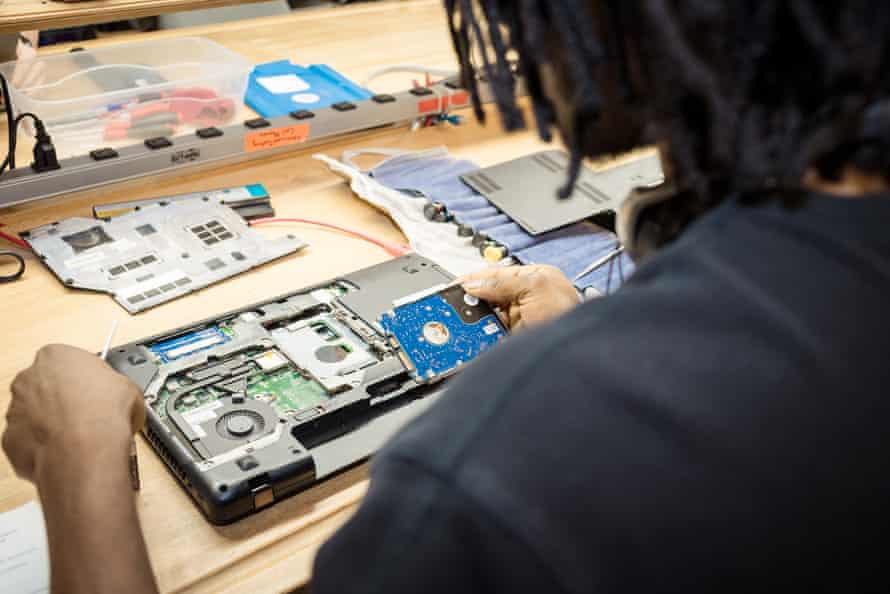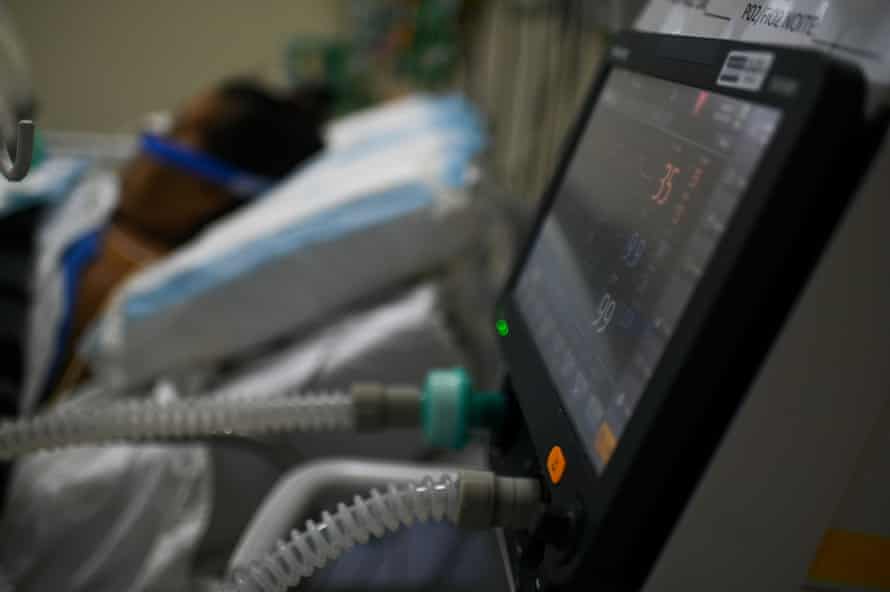Do Manufacturers Repair Look Inside The Computer
A tractor. A refrigerator. A smartphone. A ventilator. They may not seem to accept much in common, just in fact they all share increasingly loftier tech features. And when they break, they need fixing.
Yet, thanks to strict rules imposed past manufacturers, our power to exercise so remains extremely limited. Companies frequently withhold the information and tools needed to repair devices from consumers, with some warranties outright banning third parties from tinkering with products.
But that could all soon modify. Joe Biden earlier this month signed an executive guild that called on federal agencies to prioritize consumers' then-called "right to repair" their own devices, whether that means choosing an independent mechanic or doing it themselves. A calendar week after, the Federal Trade Commission took heed, voting unanimously to prioritize the upshot. Meanwhile, 25 states beyond the United states are besides considering some form of right to repair laws.
It remains to be seen how the FTC will deed, but with potentially major changes on the horizon, we heard from people who've come across difficulties trying to repair high-tech equipment – everything from farming equipment to wheelchairs and other medical devices – who shared their frustrations and their hopes for change.
The farmer: 'Right to repair is going to save some lives'
Walter Schweitzer is a 59-year-old farmer in Montana who has been working in agriculture his whole life and advocating for the right to repair for more than a decade. For him, Biden prioritizing right to repair was a huge moment.
"It's going to sound a little funny, but listening to the annunciation I had tears come up to my eyes," he said. "Because I felt like someone heard me, someone is listening, and they're going to try to exercise something about it. I've been waiting for that for years."
The majority of tractors today are cyberspace-connected, and resolving errors requires special diagnostic tools that only manufacturers, such every bit John Deere, and authorized dealers have access to or are immune to use. They often charge hundreds of dollars in phone call-out fees for repairs, which can take weeks to complete.
Schweitzer said while he has long been championing the right to repair, the event became personal for him last year when a tractor bankrupt down in the middle of harvesting his hay. A representative from the tractor company told Schweitzer they couldn't transport a mechanic to fix the vehicle for more than a week.

With rain on the horizon threatening to ruin his crop and the window to harvest beginning to shut, Scheweitzer entered a race against fourth dimension. He ultimately made the emergency conclusion to continue the harvest with a 40-twelvemonth-sometime tractor – one that was not connected to the internet.
His malfunctioning machine would not end upwardly being fixed for more than a month, a wait that would have lost him thousands of dollars. In larger operations, he said, farmers could lose hundreds of thousands of dollars because of a technology outage they are not allowed to set themselves.
"Farmers are an independent bunch," he said. "If we accept a trouble we tend to like to endeavour to fix information technology ourselves. And to tie your easily behind your dorsum, to not allow yous to gear up your tractor when you got a hailstorm coming. That'due south stressful."
Scheweitzer said these problems exacerbate the challenges farmers face, from soaring expenses to falling food prices and increasingly volatile conditions. The rate of suicide in the industry is already higher than average – one 2015 study from the Centers for Disease Command and Prevention (CDC) found male farmers in 17 states took their lives at a rate of 1.5 times higher than the general population.
"The right to repair, it might salvage united states of america money; the correct to repair is probably going to mean a more than resilient food supply – but you know what the right to repair is really going to exercise for farmers?" he said. "It'south going to save some lives."
The non turn a profit: 'everything is online at present'
Amber Schmidt is a director at Complimentary Geek, a Portland-based nonprofit that repairs one-time electronic devices and redistributes them to community members in need. She said the electric current right-to-repair restrictions by manufacturers have made made it extremely hard to salvage onetime devices.
Sometimes a specific part is needed but cannot exist purchased separately from a manufacturer. Contained repair workers have to buy them from less-reputable sources, putting machines and even user safety at risk.
"It is really difficult for us to exercise the work we demand to do when nosotros don't accept access to the tools, parts or diagnostics we need to safely and finer repair things," she said.

The inability to repair onetime devices besides creates massive amounts of electronic and electrical waste, she added, putting untold strain on the surroundings. More than fifty million tons of e-waste is generated each year, less than 20% of which is recycled.
With school and piece of work increasingly online, especially during the pandemic, admission to affordable tech is condign a crucial equity issue, Schmidt said. "Everything is online now," she said.
Simply the digital split up persists: almost a quarter of adults with household incomes below $thirty,000 a year say they don't ain a smartphone, and 41% do not own a desktop or laptop estimator. In contrast, virtually all adults in households earning $100,000 or more a yr have such devices.
Greater flexibility to repair quondam electronics would mean more affordable devices for the people who need them, Schmidt said.
"I am hopeful that the new executive society will help create a system where people can go their devices repaired where they choose to," Schmidt said. "This will help get computers back into the hands of people who don't accept admission to them otherwise."
The figurer store owner: ' Repairs have get like ownership cocaine'
Louis Rossmann is an independent repair technician who owns a shop in New York City that specializes in the repair of MacBooks – particularly logic board issues, where the main piece of hardware in a computer is compromised.

In those cases, he said Apple will often charge customers $one,500 to ready a problem he tin can fix for equally little as $200. Doing so requires finding manuals and parts simply provided to certain vendors approved by Apple. Rossmann frequently scours forums online and obtains parts from unapproved manufacturers in Communist china to get the job done.
"Often I have all the equipment and noesis I need to do the repair, only I have to await for the chips or other parts to come through the blackness market," he said. "It'due south a legal grey area."
Apple argues its devices must go through approved repair firms for security reasons – just that exclamation has been called into question in recent years post-obit privacy scandals, including one in which technicians stole illicit photos from a woman's phone.
The piece of work Rossmann does is technically non allowed by Apple'southward user agreements. But he said he feels an obligation to help his customers, who often come to him having lost all their computer files due to water damage or other issues. Apple has in the by sued contained repair shops for using certain unapproved parts in iPhone repairs.
Rossmann has amassed a following of 1.iv million people on YouTube, where he shares videos explaining how to repair a variety of devices whose manufacturers withhold such information from consumers. He said tech firms take sent him stop and desist messages regarding his aqueduct in the past, only he doesn't programme on stopping. Correct to repair could save him money and hours of piece of work finding the correct parts to repair devices, which are not readily offered past manufacturers.
"I don't feel bad at all – this is something that used to exist natural," he said. "For over 100 years, if something breaks on your car or on your air conditioner or washing auto, repair people are able to become access to what is needed to fix it. Information technology is but in recent years and on computers that doing repairs has become like buying cocaine or something."
The hospital worker: 'Intendance is being compromised and delayed'
Ilir Kullolli is the director of clinical technology and biomedical engineering science at Stanford Children'due south Health. He says the right to repair has massive implications for medical technology, and has been advocating on the issue since 2011.
Kullolli said in-firm repairs of their own medical devices such as ventilators, defibrillators and anesthesia machines saves hospitals and patients time and coin. Merely often manufacturers withhold the grooming, device manuals and software needed to complete the repairs.

"We are impacted in then many ways, the worst of which existence patient care is compromised and delayed," he said. "Waiting for a manufacturer to evidence up means you ofttimes accept to delay a example from going to the operating room, or in some cases fifty-fifty cancel it."
He said in some cases a repair tin can have more five days, especially in rural areas where local technicians are not equally accessible. This issue came into focus during the coronavirus pandemic, when delays to repairs on ventilators and other critical devices became a matter of life and death.
In add-on to such grave instances, he said the correct to repair devices can save struggling hospitals hundreds of thousands of dollars. Information shows allowing local technicians to repair their own devices is at least one-third cheaper than going to the manufacturer, he said.
Kullolli is tentatively hopeful that the executive social club – which did non put whatsoever legislation into action but prioritized the event at a federal level – will bring change.
"I'thousand just glad that the executive order got signed, and I'thou hoping it volition put u.s.a. on the correct path to become everyone access to the ability to repair devices, which nosotros all deserve," he said.
Source: https://www.theguardian.com/technology/2021/aug/02/why-right-to-repair-matters-according-to-a-farmer-a-medical-worker-a-computer-store-owner
Posted by: mckinneysormse.blogspot.com


0 Response to "Do Manufacturers Repair Look Inside The Computer"
Post a Comment